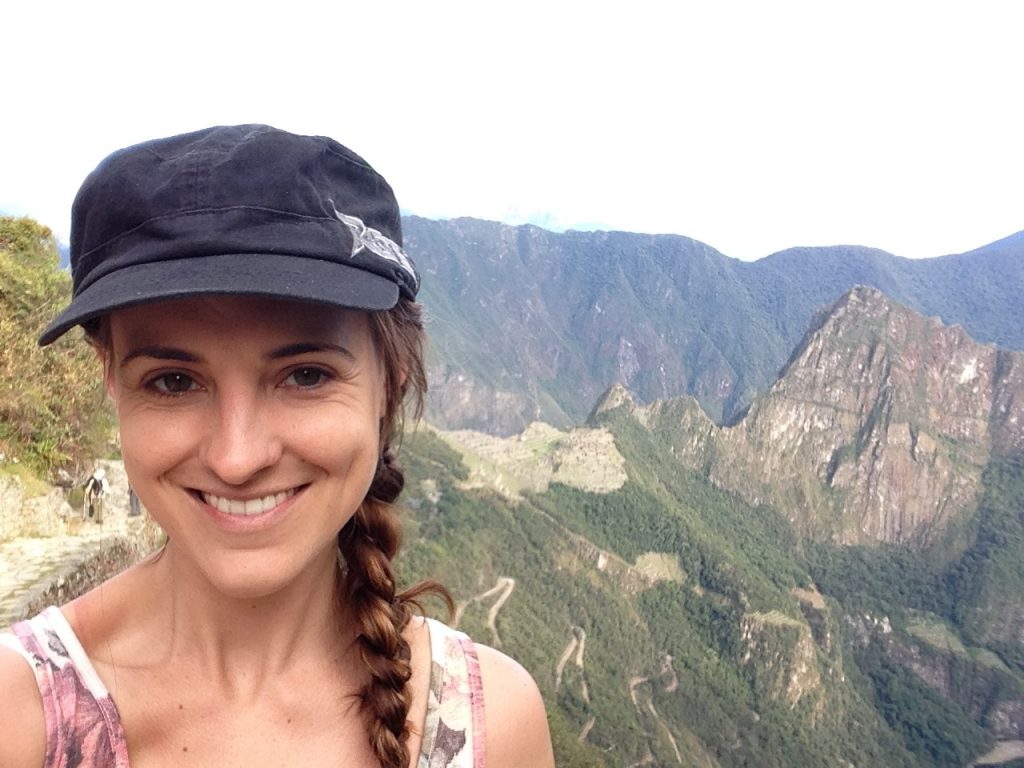
I’ve been following Gemma Critchley through her blog, Dietitian Without Borders, where she writes about her traveling adventures (she just recently returned from a month long trip to Peru), shares delicious recipes and strives to cut through all the nutrition nonsense you find online, to make sense of research and evidence then put it into practice.
When Gemma agreed to an interview, I was excited to learn more about her career starting out in Australia and ending up (so far) in the UK. Gemma has lived and traveled all over the globe which has given her a unique perspective in her practice. She graduated from the University of Wollongong (New South Wales, Australia) with a BSc in Nutrition & Dietetics and worked in a variety of clinical settings across Australia and the UK over the next 5 years.
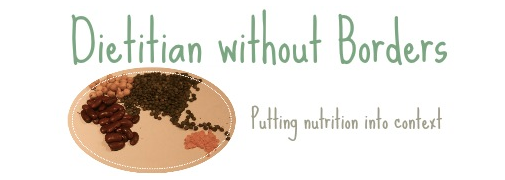
Gemma decided to relocate to the UK in 2010 to work, travel and complete her Masters in Public Health Nutrition at London School of Hygiene & Tropical Medicine. Over the years, she’s done it all– from running cooking classes for young offenders, publishing journal articles, and working as a sole-practitioner. Early last year, her position as an oncology dietitian for the National Health Service (a publicly funded health care system in the UK) was coming to an end with no chance of being extended. She began looking into other opportunities and was hired on at Dr. Schaer UK– a company who sells products for those with special nutrient requirements like celiac disease and metabolic disorders.
I’ve never interviewed an RD in your type of position. What does your job entail on a daily basis?
Working in industry, there is no such thing as a ‘typical’ day – every day is completely different! Today I visited a PKU clinic as well as taught a practical gluten-free baking lab for nutrition & dietetic postgrad students at a local University. Tomorrow I’m attending an event on the dietary management of metabolic disorders in adults. Later on this week I will be office based which can involve anything from answering ‘Ask a dietitian’ questions on coeliac disease (known as celiac in the US), gluten-free diets or IBS; reading relevant journal articles; updating nutrition content on websites; completing applications for new products on prescription, analyzing the nutrition content of recipes, creating resources for healthcare professionals…. It’s a very diverse job!
Wow, it sounds like you wear a lot of hats! Now you’re getting ready to transition into a new position– tell us about that.
Initially, when I was hired on at Dr Schaer UK, it was a part-time position working on the gluten-free side of the business. I started Dietitian without Borders – with the intent of turning it into a private practice to fill the rest of my week. On my third day of work for Dr Schaer, we got approval for a new range of prescription low-protein foods for metabolic disorders. Over time my role has evolved to working within metabolics and low-protein foods full-time. In my new position, I will be Senior Research & Development Dietitian for Vitaflo International. They create specialised nutrition supplements for metabolic disorders, malnutrition and renal conditions. My role will be looking at the nutritional profiles of the various supplements, comparing these to nutrition guidelines across various countries, advising on changes required and will also be involved in research trials for clinical efficacy to get products on presciption. Plus many other things that I’m yet to discover when I begin!
Did your Australian dietitian certification transfer over to the UK easily or did you have to pass a registration exam there as well?
In Australia we don’t have a regulatory body for dietitians so unfortunately the name can be used by anyone. Instead we have a self-regulatory body through the Dietitians Association of Australia with membership allowing the title of Accredited Practising Dietitian (APD).
When I moved over to the UK I had to register as a dietitian with the Health Care & Professions Council. This took about 4 months with lots of paperwork, certificates and letters from my university, lecturers and references to ensure that my Australian qualifications were adequate. Dietitians doing the reverse, moving from the UK to Australia need to undertake an exam in order to qualify as an APD.
What first got you interested in nutrition?
My Mum probably influenced me a lot as she is very health conscious and we always had tasty, healthy home cooked meals as I grew up. Also, spending 6 years as a teenager in Zambia developed my interest in nutrition and health because I became aware of the effects of malnutrition and how poverty and hunger negatively influenced health.
Is your current position something you’ve always imagined yourself doing or far from it?
I remember when we were looking at placements at uni (college for you Americans) thinking about industry and finding it an attractive possibility for one day down the track, but I was very passionate about clinical dietetics and loved working in the hospital. I’ve always gone into work trying to keep my options open and take up opportunities as they came my way to help that. I really enjoyed doing research in both my undergraduate and post graduate degrees so am really excited about entering this area of dietetics with my new position and having the opportunity to influence and improve products that some patients may need to consume on a daily basis.
What is the most frustrating thing about your job or being an RD?
Having people say that I’ve gone ‘to the dark side’ because I work in industry! I even had another dietitian ask recently when I left dietetics! I’m very passionate about being a dietitian and helping people to improve their lifestyle and eating habits. Many people think that it’s wrong for dietitians to work with companies but I thoroughly disagree. If we aren’t working with companies, how else can products and the food supply improve? Yes I’ve been working for a gluten-free company, but that certainly doesn’t mean that I go around recommending that every single person in the world should be following a gluten free diet. I still have my training, education, evidence based practice, code of conduct and ethics to maintain.
Do you follow any certain diet?
Not in particular. My diet is very vegetable heavy and plant-based but on the whole I eat most things and love a good steak. I try and practice balance and moderation, but am aware that I’m lucky that I can generally eat what I want without feeling deprived or worry about my weight. If I want some cake I’ll have it – but I just won’t eat a massive piece and won’t have it every day. I think there is great power in knowing that you can eat something, but you don’t necessarily have to eat it if you don’t feel like it or actually want it.
Do you take any vitamins or supplements?
Not regularly! I’ll take vitamin D on a very irregular basis – mostly because we don’t get a huge amount of sun in the UK but most of the time I forget.
What is one food you wouldn’t want to live without?
Cheese!!! Cheese is awesome. Earlier this year I thought I should really try to cut down or not eat it every day at least. I lasted 24 hours and decided that life without cheese isn’t worth it!
What is your favourite kind of cheese?
I like stronger cheeses the most, like a really mature cheddar but I’m also partial to a bit of blue here and there or brie or camembert….. Most cheeses to be honest! The only cheese I don’t really like are the really mild ones like Wensleydale. I’m not a fan of them!
Is there any food or nutrition related book or documentary that really changed the way you think about food?
Last year I read Brian Wansinks Mindless Eating. He talks about how so many external factors can influence the way we over-eat, eat when we aren’t hungry or eat mindlessly. The research he’s done is fascinating and definitely worth reading.
What are your thoughts on genetically modified foods? Do you feel strongly one way or another?
As genetically modified foods aren’t really used in either the UK or Australia, it’s not something I have massively looked into to be honest. I think it has a lot of potential benefits of where it could really help people but it needs to be well researched (are you getting the research theme here…) and people should always have the choice and know whether a food is modified or not.
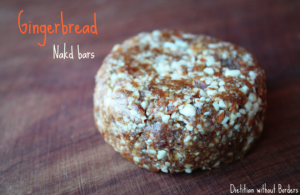 If there were 3 foods you could tell me to include in my diet to make me healthier, what would they be?
If there were 3 foods you could tell me to include in my diet to make me healthier, what would they be?
This is actually a tough one because what is important for you to be healthier could be different than what will make another person healthier. I would say that pretty much everyone could do with eating more fruit, vegetables and water though.
Do you believe in calories in vs. calories out or is there more to it?
While to an extent I agree, I believe it’s more complicated than that. There are so many factors which influence what and how we eat, how our body metabolism works and how we burn energy.
I’m sure you’ve had a ton of memorable meals while traveling– what was one of your most memorable?
I think I’d have to go with an Argentinian restaurant I visited with my now husband in Spain a few years ago after we had gotten engaged. The steak….. I have no words other than amazing!!
What would you like to accomplish in the next 5 years?
I’d like to climb Mt Kilimanjaro. It’s been on my list ever since I lived in Zambia so maybe I’ll get around to it sometime soon! I recently went to Peru and did the Inca trail which goes to a maximum 4200m above sea level. It was so strange seeing the impact the altitude had on your body. I’d be walking up the hill and constantly stopping for a rest even if I’d only covered a small amount of ground. I think climbing Kili would be a great achievement.
What do you think needs to be done to further elevate our profession and gain respect in the public eye?
I think we definitely need more dietitians on social media and out there blogging/tweeting/instagramming etc about healthy lifestyles and reliable nutrition information. There is so much conflicting (not to mention potentially dangerous) information out there that results in people being confused about what they should/shouldn’t eat. The more we get involved as a profession then the more the general public will come to think of asking a dietitian before asking anyone else.

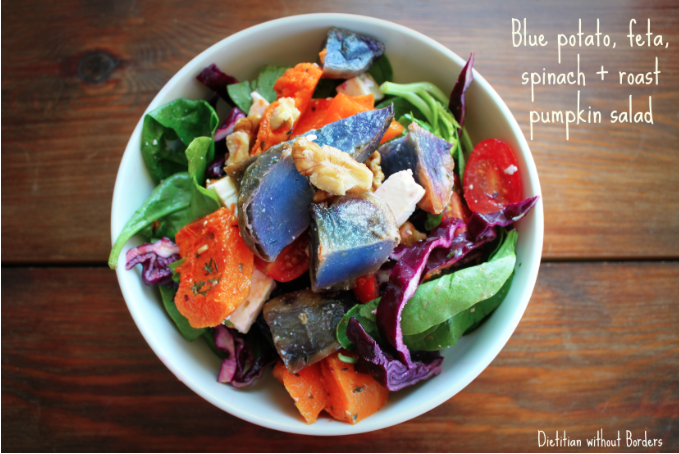
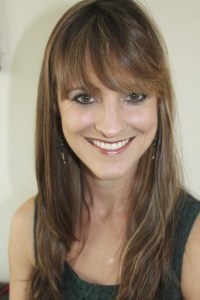 Thank you Gemma for being part of the Dietitian Spotlight Series and giving us a glimpse into your life and career as a dietitian!
Thank you Gemma for being part of the Dietitian Spotlight Series and giving us a glimpse into your life and career as a dietitian!